美国文学 霍桑介绍Nathaniel Hawthorne
- 格式:ppt
- 大小:514.00 KB
- 文档页数:19
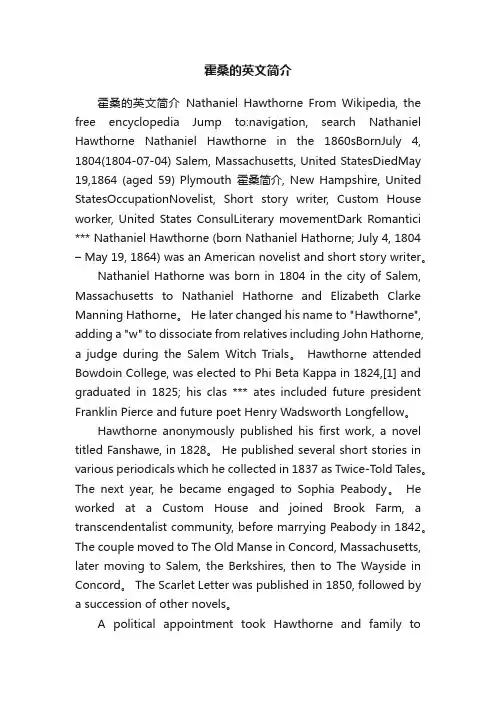
霍桑的英文简介霍桑的英文简介Nathaniel Hawthorne From Wikipedia, the free encyclopedia Jump to:navigation, search Nathaniel Hawthorne Nathaniel Hawthorne in the 1860sBornJuly 4, 1804(1804-07-04) Salem, Massachusetts, United StatesDiedMay 19,1864 (aged 59) Plymouth霍桑简介, New Hampshire, United StatesOccupationNovelist, Short story writer, Custom House worker, United States ConsulLiterary movementDark Romantici *** Nathaniel Hawthorne (born Nathaniel Hathorne; July 4, 1804 – May 19, 1864) was an American novelist and short story writer。
Nathaniel Hathorne was born in 1804 in the city of Salem, Massachusetts to Nathaniel Hathorne and Elizabeth Clarke Manning Hathorne。
He later changed his name to "Hawthorne", adding a "w" to dissociate from relatives including John Hathorne, a judge during the Salem Witch Trials。

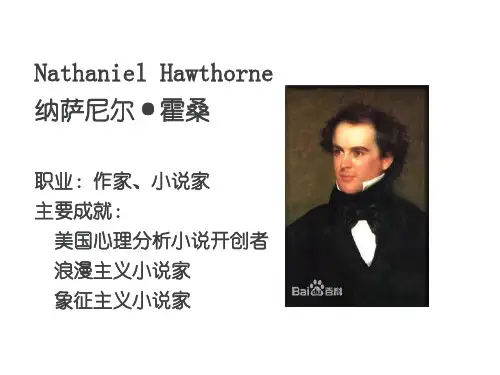
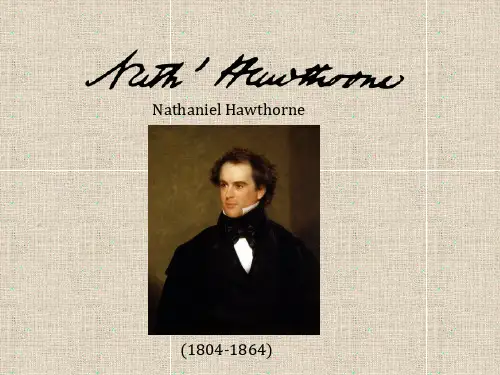
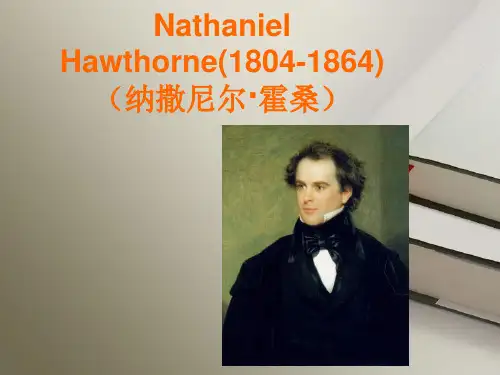


从《胎记》看霍桑的人性观1. 引言1.1 背景介绍《胎记》是美国作家纳撒尼尔·霍桑(Nathaniel Hawthorne)所著的一篇短篇小说,被认为是霍桑最具代表性的作品之一。
小说讲述了一个男人与他贫困但心地善良的妻子之间的故事,男人因为妻子脸上的一处胎记而感到不满,并试图用一种神秘的方法将其消灭。
这部作品展现了霍桑对人性的深刻思考,揭示了人性的复杂性和脆弱性。
胎记在文学史上具有重要地位,它不仅是一部优秀的文学作品,更是对人性的深刻解读。
通过胎记中的人物形象和情节安排,霍桑展现了他对人性的独特见解,引发了人们对自身内心深处的反思。
胎记所蕴含的道德警示和思想启示也使其成为一部永不过时的经典之作。
在接下来的正文中,我们将对《胎记》中的人性描写、人性的多样性、人性的脆弱性、人性的复杂性以及胎记中的道德观进行深入分析,以揭示霍桑人性观的独特特点,探讨《胎记》对人性的启示,以及这部作品在当今社会中的现实意义。
通过对霍桑的作品进行深入探讨,我们或许能更好地理解人性的奥秘,以及如何在现实生活中应对各种复杂的人性问题。
1.2 作者简介霍桑(Nathaniel Hawthorne)是19世纪美国著名作家,被认为是美国文学的奠基人之一。
他生于1804年,逝世于1864年,其一生大部分时间都在马萨诸塞州度过。
霍桑是一位深受浪漫主义和象征主义影响的作家,他的作品充满了对人性、罪恶和道德的探讨。
霍桑的作品常常揭示人性的复杂性和多样性。
他深刻地描绘了人类内心深处的黑暗和矛盾,对人性进行了深刻而丰富的揭示。
在他的作品中,人性往往被描绘成脆弱而复杂的存在,充满着各种矛盾和挣扎。
霍桑的作品《胎记》也是对人性的一次深刻探讨。
通过主人公乔治和艾琳娜的故事,霍桑揭示了人性的多样性和复杂性。
他通过描写人物的内心世界和行为举止,深刻地展示了人性的脆弱性和不完美性。
他还通过故事中的道德观念,探讨了人性与道德之间的关系,引发了人们对人性和道德的深刻思考。
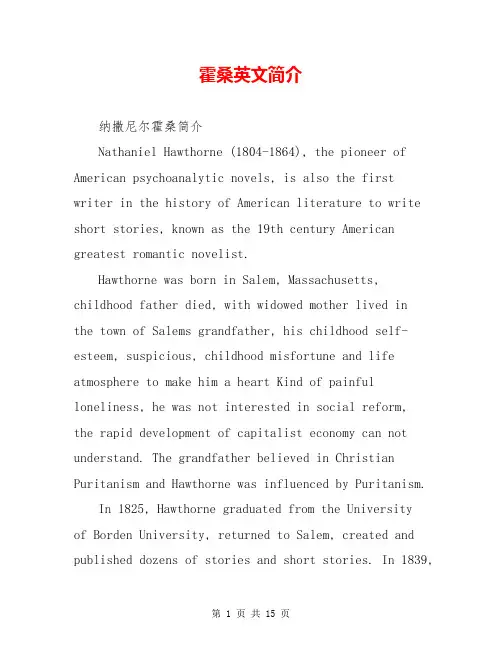
霍桑英文简介纳撒尼尔霍桑简介Nathaniel Hawthorne (1804-1864), the pioneer of American psychoanalytic novels, is also the firstwriter in the history of American literature to write short stories, known as the 19th century American greatest romantic novelist.Hawthorne was born in Salem, Massachusetts, childhood father died, with widowed mother lived inthe town of Salems grandfather, his childhood self-esteem, suspicious, childhood misfortune and life atmosphere to make him a heart Kind of painful loneliness, he was not interested in social reform,the rapid development of capitalist economy can not understand. The grandfather believed in Christian Puritanism and Hawthorne was influenced by Puritanism.In 1825, Hawthorne graduated from the Universityof Borden University, returned to Salem, created and published dozens of stories and short stories. In 1839,Hawthorne worked at the Boston Customs for more than two years, then entered the Brook Farm, touching transcendentalism, and met the representative of transcendentalism thought Emerson and Thoreau and others.Since then, Hawthorne went to Salem Customs office, Salem customs life for his creation of Scarlet Letter has a direct impact, The Scarlet Letter published his solid position in the American literary world, butalso to the future with a huge influences.Hawthorne was evaluated as a bystander of life,and this attitude of life determines his interest and insight in his inner and psychological activities. He was deeply influenced by the original sin thought, and the original sin was passed on from generation to generation, and the people were guided by good deedsto purify the evil and purify the mind.His masterpieces include the novel The Scarlet Letter, Hexagon Building, short story collectionrepeat the story again, ancient moss, snow shadow and so on. The Scarlet Letter has become the worldsliterary classics, Henry James, Ellen Poe, Herman Melville and other literary masters are deeply affected.纳撒尼尔霍桑人物经历HeresyThe direct influence on Hawthornes creativethinking is his understanding of family history and religion. Hawthornes ancestors from the England region of the family, generations are devout Calvin believers. The two generations of ancestors were the dignitaries of the Massachusetts political and religious unity. One is the first speaker of the Massachusetts Colonial Parliament, named William Hassan, notorious for participating in the persecution of the Whigs. The other is his uncle, named John Hassan, served as alocal judge. In 1692, in the town of Salem, Massachusetts took place in the history of the famous deceit. At that time the town of Salem popular with a similar epilepsy infectious diseases, it was falsely accused of this Department of witch trouble. In some Western countries there is a traditional idea that thewitch is the companion of the devil Satan, who have received a supernatural power from Satan, who specializes in the spread of diseases and the killing of babies and so on. The town of Salem is the place where the Calvinist forces are strong, and the Calvin sects have struggled with the Whigs to compete for religious power in order to eliminate the heresy. The case involved a wide range, more than 200 people were arrested, 150 people were imprisoned, more than 10 people were hanged, in fact, this is a religious persecution, many of the victims were innocent residents. Hawthornes uncle, John, acted as a judge in the event and was known for his religious fanaticalness and cruelty.Hawthornes understanding of the history of the whole family, especially his study of the ancestors of the 17th century from England to the North American colonial continent and later fortune research and research made him a more comprehensive understanding of the familys development history and Social status of the New England region in the 19th century. At thattime the society was at the beginning of the rapid development of the capitalist economy, and the social structure had undergone major changes and adjustments. In his view, the progress of technology and the use of the machine not only can not improve the moral character of society, but people into a deeper sin whirlpool, a evil wizard. For which he was in front of what happened to be more do not understand. He had come into contact with transcendentalism and had participated in the brooks of the transgressors, but he looked at the activities of Emerson and others with indifference, and even opposed it. Hawthorne was not interested in any social reform program, and even cautious about the major problems of American society at that time. His conservative attitude and the lack of understanding of society are reflected in his deep-rooted Puritan religious consciousness. The intense religious factional struggle in the society and the moral values involved in this struggle had had a significant impact on Hawthornes work. And in many of his works, Hawthorne directly or indirectly attackedthe Galvin religion against the religious fanaticism and the destruction of human religious precepts. Butin the depths of his thought still with a strong religious concept of good and evil to see the world,he can not understand, due to the development of capitalism caused by the new social contradictions united into an abstract evil.In his view, all social problems, thecontradictions between people, the phenomenon of crime and so on are not the root of social material life,but because of the worlds inherent evil caused. Thisis the influence of the idea of original sin and the inner fall in the doctrine of Calvinism on Hawthornes thought. According to Hawthornes point of view, if you want to solve all social problems need to start from the evil, must be from the internal mining. Therefore, in his view, all abstract, mysterious evil are theroot cause of social problems.Family influenceIn Hawthornes family, two ancestors are important administrative officials in the Massachusetts colonies.Nathaniel Hawthornes first generation of ancestors William Hawthorne came from England in 1963 to Massachusetts, in this early colony, William Hawthorne is a prominent figure.Hawthorne disagreed with the behavior of his ancestors, the atrocities committed by his ancestors, was so ashamed of Hawthornes understanding of religion than the average person, and he hated his ancestral practice. The second generation of ancestors John Hawthorne was involved in the trial of the 1692 statement of the messy Salem deceit, which is one of the three judges, Hawthorne that the behavior of ancestors is a sin, a shame , This event to the young Hawthorne left a deep scars, Hawthorne on his ancestral behavior felt deep self-blame, this remorse so that he in his last name Hawthorne added a w To become FHawthorne to show that he is different from the sinful ancestors.Humanistic influence1825 - 1837, spent 12 years in his hometown had a significant impact on Hawthorne becoming a writer. Inhis hometown, Hawthorne was keen to explore thehistory of his hometown. He had read every book in the local library, and he was familiar with the ancient history of the town of Salem, especially the witchcraft. He studied the historical literature about England and engaged in novel creation. Most of his works are based on the brutal religious domination of the colonial period as the background, describing the peoples spiritual world, ideological contradictions and religious oppression under the tragic experience.Hawthorne saw the religious fanaticism and religious doctrine to bring the impact of people, he saw the religious destruction of human nature. In this area of Massachusetts, religion is very closely linked to peoples lives, and religion permeates all aspects of life, and religion is even equivalent to law, with supreme authority and effect, but on the other hand, the harsh rule of Puritanism and fanatical Religious worship is to some extent a cruel trampling of human dignity.Salem is a place where the Calvin Puritan atmosphere is very strong, because here is relatively backward, science is not developed, so the local peoples ignorance, this place has a lot of magical folklore and fairy tales, while people advocate Hypnosis, witchcraft activities spread here, the introduction of Calvin Puritanism in North America had a great impact on Hawthorne, it greatly affected the way Hawthorne recognized the world.Hawthornes era of life Although the Puritan thought is no longer the leading force of New England, but Puritanism on the American life and ideological influence is far-reaching, Hawthornes character and Puritanism thought milk blend, puritanism thought His way of thinking and the attitude of the problem, inevitably make Hawthorne from the perspective of Puritanism to observe people and the world, Hawthorne has a deep thinking and understanding of Puritanism, he was some active in Puritan Of the factors are positive attitude, such as the early American Puritans who have the pioneering spirit, perseverance of thespirit, which is in the body of Hester Prynne is reflected. But on the other hand, the asceticism in Puritanism and the oppression of Puritanism against humanity are what the authors do not agree with and criticize. From the historical understanding of the United States, Hawthorne can profoundly grasp the Puritanisms history of the United States , But therule and norms of Yan Xun can in some way make people lose their original nature, and Hawthorne is well versed in the influence of Puritanism on people, and The Puritanism has a clear understanding and thinking, although the Puritan rule is no longer strict, but some eternal topics such as the relationship between man and God and the relationship between man and religion, human nature in the good and evil andpeoples morality Criteria are the subject of concern and concern.Hawthornes life is the American Renaissance, the19th century European romantic thoughts across the sea, came to North America this land, coupled with theNorth American colonial puritanism thought strong,romantic and local clear The combination ofdoctrinalism creates a transcendentalist philosophythat has had a significant impact on the later US. Transcendentalism is an important ideological movement in the United States. The period of Americanliterature in the transcendentalism is called the American Renaissance. Transcendentalism is an ideological and cultural liberation movement with religious colors. Literature and culture have had a significant impact, with profound philosophicalthinking as the background, emphasizing the supreme spirit of the spirit and the absolute perception ofthe traditional religion to refute, the representative of Ralph Waldo Emerson (Ralph FWaldo FEmerson), Henry Davav Thoreau.Before and after 1841, the wave of transcendentalism swept through Boston and its neighboring areas, and Hawthorne was influenced by transcendentalism. Transcendentalism believed that there was an ideal transcendentalist entity in the universe, Experience, people can be intuition to grasp,people can understand the truth through intuition, within a certain range of people is God, they are a new round of religious reflection and criticism, they abandon the Calvin sect God as the center Point of view, against rationality, advocating intuition, to promote the humanistic spirit, advocate individual liberation, emphasizing the value of individuals, this trend on the society at that time had a great impact, especially for Europes dominant theological ideas, transcendentalism The liberation of American ideology and culture, but also affected the American literature, an indispensable part of American literature.Although Hawthorne is not transcendentalist fanatical followers, but his relationship with Emerson and Thoreau are very close, in their daily lives,their contacts are pleasant.Creation periodIn 1837, Hawthornes first short story collection repeat the story again to bring him some fame.After 1845, Hawthorne entered the creation of the mature period, in 1846 launched the second short storyancient house moss, but the book only to bring him a modest income. Hawthorne once again seek the help of political friends, get a government office, any Salem customs inspector, served for three years to give up the work. In 1848 the presidential general, different political parties came to power, then replaced a large number of government officials, Hawthorne is also one of them. He experienced a heart and body suffering,and finally calm down, began to create his most famous novel Scarlet Letter.In 1850, the Scarlet Letter made him famous. The Scarlet Letter is the first symbolist novel in the history of American literature. Since the novelfocuses on Hawthornes creative personality and experience, he was immediately criticized by thecritics as the greatest writer born in this century. Scarlet income so that he out of poverty, Hawthornebid farewell to his hometown, his family moved to Massachusetts, West Burke County Lennox. In the Lennox, Hawthornes creation began to peak, masterpiece gush.1851 completed the seven sharp angle of the house is the description of the family history of the decline of the novel. In 1851 also published a short story collection Snow Shadow.In 1852, for the classmate Franklin Pierce campaign president, launched biography: Franklin Pierce Biography, the works received by Pierce appreciation. Franklin Pierce was elected president, appointed Hawthorne as US Consul General in Liverpool, England.1853 published fairy tale chaotic grove story, the two fairy tale has become the classic American childrens literature.Hawthorne during his tenure (1853-1857), he fully understood the British customs, the road impression into the British notes (Hawthorne after the death of the notes published by his wife), and essays our home (Published in 1863). In 1858, he traveled to France and Italy, written as French and Italian notes, the novel jade statue (published in 1860). Jade statue toItaly as the background, is Hawthorne created the last complete novel.。

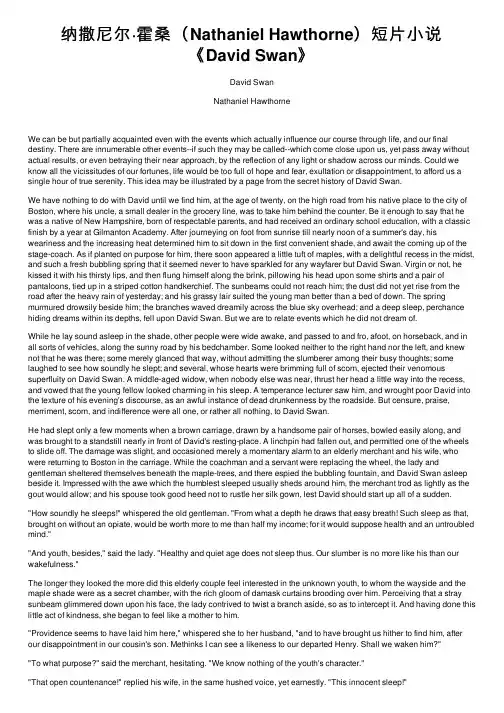
纳撒尼尔·霍桑(Nathaniel Hawthorne)短⽚⼩说《David Swan》David SwanNathaniel HawthorneWe can be but partially acquainted even with the events which actually influence our course through life, and our final destiny. There are innumerable other events--if such they may be called--which come close upon us, yet pass away without actual results, or even betraying their near approach, by the reflection of any light or shadow across our minds. Could we know all the vicissitudes of our fortunes, life would be too full of hope and fear, exultation or disappointment, to afford us a single hour of true serenity. This idea may be illustrated by a page from the secret history of David Swan.We have nothing to do with David until we find him, at the age of twenty, on the high road from his native place to the city of Boston, where his uncle, a small dealer in the grocery line, was to take him behind the counter. Be it enough to say that he was a native of New Hampshire, born of respectable parents, and had received an ordinary school education, with a classic finish by a year at Gilmanton Academy. After journeying on foot from sunrise till nearly noon of a summer's day, his weariness and the increasing heat determined him to sit down in the first convenient shade, and await the coming up of the stage-coach. As if planted on purpose for him, there soon appeared a little tuft of maples, with a delightful recess in the midst, and such a fresh bubbling spring that it seemed never to have sparkled for any wayfarer but David Swan. Virgin or not, he kissed it with his thirsty lips, and then flung himself along the brink, pillowing his head upon some shirts and a pair of pantaloons, tied up in a striped cotton handkerchief. The sunbeams could not reach him; the dust did not yet rise from the road after the heavy rain of yesterday; and his grassy lair suited the young man better than a bed of down. The spring murmured drowsily beside him; the branches waved dreamily across the blue sky overhead; and a deep sleep, perchance hiding dreams within its depths, fell upon David Swan. But we are to relate events which he did not dream of.While he lay sound asleep in the shade, other people were wide awake, and passed to and fro, afoot, on horseback, and in all sorts of vehicles, along the sunny road by his bedchamber. Some looked neither to the right hand nor the left, and knew not that he was there; some merely glanced that way, without admitting the slumberer among their busy thoughts; some laughed to see how soundly he slept; and several, whose hearts were brimming full of scorn, ejected their venomous superfluity on David Swan. A middle-aged widow, when nobody else was near, thrust her head a little way into the recess, and vowed that the young fellow looked charming in his sleep. A temperance lecturer saw him, and wrought poor David into the texture of his evening's discourse, as an awful instance of dead drunkenness by the roadside. But censure, praise, merriment, scorn, and indifference were all one, or rather all nothing, to David Swan.He had slept only a few moments when a brown carriage, drawn by a handsome pair of horses, bowled easily along, and was brought to a standstill nearly in front of David's resting-place. A linchpin had fallen out, and permitted one of the wheels to slide off. The damage was slight, and occasioned merely a momentary alarm to an elderly merchant and his wife, who were returning to Boston in the carriage. While the coachman and a servant were replacing the wheel, the lady and gentleman sheltered themselves beneath the maple-trees, and there espied the bubbling fountain, and David Swan asleep beside it. Impressed with the awe which the humblest sleeped usually sheds around him, the merchant trod as lightly as the gout would allow; and his spouse took good heed not to rustle her silk gown, lest David should start up all of a sudden. "How soundly he sleeps!" whispered the old gentleman. "From what a depth he draws that easy breath! Such sleep as that, brought on without an opiate, would be worth more to me than half my income; for it would suppose health and an untroubled mind.""And youth, besides," said the lady. "Healthy and quiet age does not sleep thus. Our slumber is no more like his than our wakefulness."The longer they looked the more did this elderly couple feel interested in the unknown youth, to whom the wayside and the maple shade were as a secret chamber, with the rich gloom of damask curtains brooding over him. Perceiving that a stray sunbeam glimmered down upon his face, the lady contrived to twist a branch aside, so as to intercept it. And having done this little act of kindness, she began to feel like a mother to him."Providence seems to have laid him here," whispered she to her husband, "and to have brought us hither to find him, after our disappointment in our cousin's son. Methinks I can see a likeness to our departed Henry. Shall we waken him?""To what purpose?" said the merchant, hesitating. "We know nothing of the youth's character.""That open countenance!" replied his wife, in the same hushed voice, yet earnestly. "This innocent sleep!"While these whispers were passing, the sleeper's heart did not throb, nor his breath become agitated, nor his features betray the least token of interest. Yet Fortune was bending over him, just ready to let fall a burden of gold. The old merchant had lost his only son, and had no heir to his wealth except a distant relative, with whose conduct he was dissatisfied. In such cases, people sometimes do stranger things than to act the magician, and awaken a young man to splendor who fell asleep in poverty."Shall we not waken him?" repeated the lady persuasively."The coach is ready, sir," said the servant, behind.The old couple started, reddened, and hurried away, mutually wondering that they should ever have dreamed of doing anything so very ridiculous. The merchant threw himself back in the carriage, and occupied his mind with the plan of a magnificent asylum for unfortunate men of business. Meanwhile, David Swan enjoyed his nap.The carriage could not have gone above a mile or two, when a pretty young girl came along, with a tripping pace, which showed precisely how her little heart was dancing in her bosom. Perhaps it was this merry kind of motion that caused--is there any harm in saying it?--her garter to slip its knot. Conscious that the silken girth--if silk it were--was relaxing its hold, she turned aside into the shelter of the maple-trees, and there found a young man asleep by the spring! Blushing as red as any rose that she should have intruded into a gentleman's bedchamber, and for such a purpose, too, she was about to make her escape on tiptoe. But there was peril near the sleeper. A monster of a bee had been wandering overhead--buzz, buzz, buzz--now among the leaves, now flashing through the strips of sunshine, and now lost in the dark shade, till finally he appeared to be settling on the eyelid of David Swan. The sting of a bee is sometimes deadly. As free hearted as she was innocent, the girl attacked the intruder with her handkerchief, brushed him soundly, and drove him from beneath the mapleshade. How sweet a picture! This good deed accomplished, with quickened breath, and a deeper blush, she stole a glance at the youthful stranger for whom she had been battling with a dragon in the air."He is handsome!" thought she, and blushed redder yet.How could it be that no dream of bliss grew so strong within him, that, shattered by its very strength, it should part asunder, and allow him to perceive the girl among its phantoms? Why, at least, did no smile of welcome brighten upon his face? She was come, the maid whose soul, according to the old and beautiful idea, had been severed from his own, and whom, in all his vague but passionate desires, he yearned to meet. Her, only, could he love with a perfect love; him, only, could she receive into the depths of her heart; and now her image was faintly blushing in the fountain, by his side; should it pass away, its happy lustre would never gleam upon his life again."How sound he sleeps!" murmured the girl.She departed, but did not trip along the road so lightly as when she came.Now, this girl's father was a thriving country merchant in the neighborhood, and happened, at that identical time, to be looking out for just such a young man as David Swan. Had David formed a wayside acquaintance with the daughter, he would have become the father's clerk, and all else in natural succession. So here, again, had good fortune--the best of fortunes--stolen so near that her garments brushed against him; and he knew nothing of the matter.The girl was hardly out of sight when two men turned aside beneath the maple shade. Both had dark faces, set off by cloth caps, which were drawn down aslant over their brows. Their dresses were shabby, yet had a certain smartness. These were a couple of rascals who got their living by whatever the devil sent them, and now, in the interim of other business, had staked the joint profits of their next piece of villany on a game of cards, which was to have been decided here under the trees. But, finding David asleep by the spring, one of the rogues whispered to his fellow,"Hist!--Do you see that bundle under his head?" The other villain nodded, winked, and leered."I'll bet you a horn of brandy," said the first, "that the chap has either a pocket-book, or a snug little hoard of small change, stowed away amongst his shirts. And if not there, we shall find it in his pantaloons pocket.""But how if he wakes?" said the other.His companion thrust aside his waistcoat, pointed to the handle of a dirk, and nodded."So be it!" muttered the second villain.They approached the unconscious David, and, while one pointed the dagger towards his heart, the other began to search the bundle beneath his head. Their two faces, grim, wrinkled, and ghastly with guilt and fear, bent over their victim, looking horrible enough to be mistaken for fiends, should he suddenly awake. Nay, had the villains glanced aside into the spring, even they would hardly have known themselves as reflected there. But David Swan had never worn a more tranquil aspect, even when asleep on his mother's breast."I must take away the bundle," whispered one."If he stirs, I'll strike," muttered the other.But, at this moment, a dog scenting along the ground, came in beneath the maple-trees, and gazed alternately at each of these wicked men, and then at the quiet sleeper. He then lapped out of the fountain."Pshaw!" said one villain. "We can do nothing now. The dog's master must be close behind.""Let's take a drink and be off," said the otherThe man with the dagger thrust back the weapon into his bosom, and drew forth a pocket pistol, but not of that kind which kills by a single discharge. It was a flask of liquor, with a block-tin tumbler screwed upon the mouth. Each drank a comfortable dram, and left the spot, with so many jests, and such laughter at their unaccomplished wickedness, that they might be said to have gone on their way rejoicing. In a few hours they had forgotten the whole affair, nor once imagined that the recording angel had written down the crime of murder against their souls, in letters as durable as eternity. As for David Swan, he still slept quietly, neither conscious of the shadow of death when it hung over him, nor of the glow of renewed life when that shadow was withdrawn.He slept, but no longer so quietly as at first. An hour's repose had snatched, from his elastic frame, the weariness with which many hours of toil had burdened it. Now he stirred--now, moved his lips, without a sound--now, talked, in an inward tone, to the noonday spectres of his dream. But a noise of wheels came rattling louder and louder along the road, until it dashed through the dispersing mist of David's slumber-and there was the stage-coach. He started up with all his ideas about him."Halloo, driver!--Take a passenger?" shouted he."Room on top!" answered the driver.Up mounted David, and bowled away merrily towards Boston, without so much as a parting glance at that fountain of dreamlike vicissitude. He knew not that a phantom of Wealth had thrown a golden hue upon its waters--nor that one of Love had sighed softly to their murmur--nor that one of Death had threatened to crimson them with his blood--all, in the brief hour since he lay down to sleep. Sleeping or waking, we hear not the airy footsteps of the strange things that almost happen. Does it not argue a superintending Providence that, while viewless and unexpected events thrust themselves continually athwart our path, there should still be regularity enough in mortal life to render foresight even partially available?——From /hawthorne/128/。

纳撒尼尔霍桑是美国十九世纪最杰出的浪漫主义作家之...AbstractNathaniel Hawthorne‘s ―The Birthmark‖, s imilar to other Hawthorne‘s short stories, is allegorical and gloomy, digging deep to reveal the darker aspect of human nature. Throughout the story, Hawthorne employs overwrought symbolism and other various literary devices to enhance his theme that limitless power of science is destructive. With the purpose of examining how Hawthorne uses stylistic techniques to engross readers in this incredible story, this thesis will firstly present an overview of stylistics and introduce some influential previous researches on Hawthorne and ―The Birthmark‖, which are followed by a brief account of Dark Romanticism. Furthermore, it will carry out a comprehensive stylistic analysis of this story in phonetic, lexical, syntactic, semantic and contextual aspects. Finally, since ―The Birthmark‖ bears major features of the unique writing style of Dark Romanticism, a conclusion will be drawn to summarize the main characteristics of this genre which are embodied in ―The Birthmark‖. Thus, a fuller appreciation of this story as well as that of the American Dark Romanticism will be ultimately achieved.Key Words: Hawthorne, Dark Romanticism, stylistic analysis, psychology, moral seriousness, complexity摘要纳撒尼尔·霍桑是美国十九世纪最杰出的浪漫主义作家之一,其小说风格独特,对美国文学发展产生了积极深远的影响。
Nathaniel Hawthorne (霍桑)1. Hawthorne’s Life Storya. born into the family of a sea captain, in Salem 塞勒姆b. When he was born, his family declined. He was aware of hisancestors' misdeeds and thus "blackness of Hawthorne" formed.He thought that the reason of his family's decline is hisancestors' misdeeds.His original family name was “Hathorne”.Why did he insert a “w”into his name:HathorneHawthorneT o escape the curse put on his family by his ancestorsHis ancestor John Hathorne had taken part in the famous Witchcraft T rials in Salem塞勒姆驱巫案•c. In 1821 he entered Bowdoin College and graduated in 1825 in•the class with Longfellow and Franklin Pierce, later•president of the United States.•d. Between 1825-1837, the twelve years were so-called•“seclusion”隐居, when he•lived in his mother’s Salem home to read widely and prepare•for his literary career•his first book is a collection of short stories Twice-told Tales 《故事新编》gained critical attention.•e. In 1841-1842, he stayed at Brook Farm and took part in the transcendental experiment and married Sophia Peabody, a transcendentalist------ the inspiration of The Blithedale Romance《福谷传奇》•f. After marriage, they lived in a house named Old Manse.•it was there, Hawthorne wrote his collection of short stories Mosses from an Old Manse«古宅青苔»•Lately, from 1839 to 1849, he worked in the US Custom office .海关•g. In 1853, After Pierce became president, he was asked to be the consul领事in Liverpool and Italy.•Italy is the setting of one of his novels---The Marble Faun《大理石雕像》•h. After 1860 Hawthorne lived in Concord and devoted his•remaining years to literature until he died suddenly while on• a trip to New Hampshire with his lifelong friend Pierce.2.Hawthorne’s Major Works1). Two collections of short stories:⏹Twice-told Tales 《故事新编》⏹Mosses from an Old Manse«古宅青苔»Short stories:Young Goodman Brown《小伙子古德曼·布朗》The Minister’s Black V eil《教长的黑面纱》The Birthmark 《胎记》2). Novels( 1) The Blithedale Romance《福谷传奇》(2) The House of the Seven Gables《七个尖角阁的房子》(3) The Marble Faun《大理石雕像》(4) The Scarlet Letter«红字»3. Hawthorne’s point of viewThe Blackness of Hawthorne▪Hawthorne is influenced by Puritanism deeply. He was not a Puritan himself, but he had Puritan ancestors who played an important role in his life and works.He was aware of the misdeeds of his Puritan ancestors, which led to his understanding of evil at the core of human life.▪Melville : “霍桑描写黑暗的巨大力量,是由于受到加尔文派交易关于与生俱来的堕落与原罪思想的影响。
霍桑生平大事转自理想藏书-作家与作品-美国相关霍桑生平大事--------------------------------------------------------------------------------纳撒尼尔·霍桑(NathanieI Hawthorne,1804-1864)霍桑,(Nathaniel Hawthorne 1804~1864)美国小说家。
1804年7月4日生于马萨诸塞州塞勒姆镇一个没落世家,1864年5月19日卒于新罕普郡的普利茅斯。
4岁丧父,1821年由亲戚资助进入博多因学院。
1825年毕业后回到塞勒姆从事写作。
曾自费出版长篇小说《范肖》,发表很多短篇作品,出版短篇集《古宅青苔》、《雪影》等。
他的短篇小说大都取材于新英格兰的历史和现实生活,着重探讨人性和人的命运,带有较浓重的宗教气息和神秘色彩。
名篇《小伙子布朗》、《教长的黑纱》等揭示人人皆有的隐秘的罪恶和人的必然的孤独处境。
一些故事反映了作者对理性、科学和技术进步的怀疑少数作品正面表达了他的理想,如《石面人像》。
1836年和1846年两度在海关任职,1841年参加超验主义者创办的布鲁克农场。
1842年后结识了作家爱默生、梭罗等。
1848年因政府更迭失去海关职位,后专心写作,完成了他最重要的长篇小说《红字》。
小说取材于殖民地时期的新英格兰生活,主人公是因犯加尔文教派所严禁的通奸罪而被标上红字示众的少妇白兰。
作者细致深入地揭示人的内心冲突,探讨了种种有关罪恶和人性的道德、哲理问题,对几个主要人物,如在磨难和赎罪中走向自新的海斯特·白兰,被良心、信仰和爱情苦苦折磨的狄姆斯台尔牧师,以及白兰的丈夫、一心谋求报复的罗杰,都有入木三分的描写。
小说以监狱和玫瑰花开场,以墓地结束,充满丰富的象征寓义。
随后发表的《带有七个尖角阁的房子》讲述品恩钦家族的祖先谋财害命而使后代遭到报应的故事,反映了早期美国社会中的血腥掠夺,以及作者对人的罪恶(特别是祖先的罪过)的异常关注。